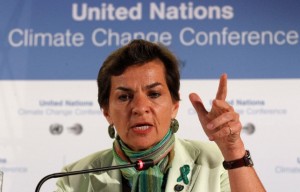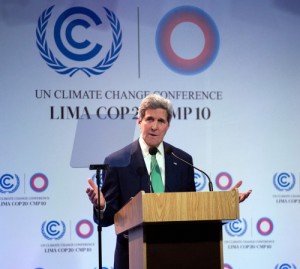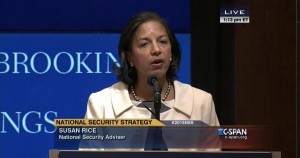Editor’s Note – Who is the United Nation’s Framework Convention on Climate Change (UNFCCC) Executive Secretary, Christiana Figueres and why does it matter?
Meet Chistiana – this abbreviated list of associations below will tell you a lot and her words place the capstone on why Obama, Susan Rice, and Kerry consider climate change so important and that ISIS is not an existential threat to the US. Guess what, its not about climate change, its about intentionally transforming the world’s economic development model.
“…a complete transformation of the economic structure of the world” – Christiana Figueres Qatar 2010

Christiana Figueres – Appointed Executive Secretary of the UN Framework
Convention on Climate Change (UNFCCC) in 2010
Surprised? Here are those associations:
- Her father and brother were multi-term Presidents of Costa Rica, famous for dismantling their armed forces;
- She is a Member of the Carbon Finance Working Group of Project Catalyst;
- She is the UN’s Millennium Development Goals and the upcoming Sustainable Development Goals;
- She is an Advisory Committee Member of Green Cross International, founded by Pres. Gorbachev with members like Robert Redford and Ted Turner along with Pat Mitchell, PBS President among many other leftists across the globe;
- She is an invited member of the Clinton Global Initiative
- She is a member of the Global Roundtable on Climate Change led by Jeffrey Sachs at Columbia University, “Mr. Sustainable Development” himself;
- She was personally trained by Al Gore to deliver his presentation of ‘An Inconvenient Truth’ and tweets about Gore’s and Pharrell’s Live Earth 2015 concerts;
- She even blogs at the UNFCCC;
- Here is here CV and her words are highlighted below, see also “Desperate Dash of Global Warming” at the New American
She is the type that drives and praises Obama, Susan Rice, and John Kerry. They align themselves with “junk science” to promote “junk economics” and that Agenda 21 crowd, now isn’t that a National Security Threat. Now you know why they say climate change is a bigger threat to our national security than ISIS.
UN Climate Chief: We Are Remaking The World Economy
By Michael Bastach at the Daily Caller
The United Nation’s climate chief says that reordering the global economy to fight climate change is the “most difficult” task the international body has ever undertaken.
 “This is probably the most difficult task we have ever given ourselves, which is to intentionally transform the economic development model, for the first time in human history,” Christiana Figueres, who heads up the U.N.’s Framework Convention on Climate Change, told reporters.
“This is probably the most difficult task we have ever given ourselves, which is to intentionally transform the economic development model, for the first time in human history,” Christiana Figueres, who heads up the U.N.’s Framework Convention on Climate Change, told reporters.
“This is the first time in the history of mankind that we are setting ourselves the task of intentionally, within a defined period of time, to change the economic development model that has been reigning for the, at least, 150 years, since the industrial revolution,” Figueres said.
Figueres’s remarks come ahead of a meeting in Geneva next week where delegates will pour over draft treaty texts that the U.N. hopes countries will agree to in December. She doesn’t expect global warming to be solved by one treaty, but was optimistic in will be solved in the coming years.
“That will not happen overnight and it will not happen at a single conference on climate change, be it COP 15, 21, 40 – you choose the number,” she said. “It just does not occur like that. It is a process, because of the depth of the transformation.”
The climate chief even held up President Obama as a shining example of steps countries can take to tackle global warming.
“The international community is quite grateful for the fact that in his second term, President Obama has turned his attention quite clearly and quite decisively to climate change,” Figueres told reporters.
“He has not only spoken about his commitment both to his national agenda on climate change, but also to the international process, and has been quite clear in his political leadership,” Figueres said, touting the EPA’s success cutting carbon dioxide emissions from power plants.
The EPA will finalize rules to cut carbon emissions from new and existing power plants this summer. Critics of these rules say they will hurt the economy through job losses and higher energy prices. Supporters, however, say it will spur green energy development and set an example for other countries to follow.
Obama’s 2016 budget proposal boosts EPA funding to help it finalize emissions rules for power plants. The budget would also give the EPA $4 billion to reward states that reduce emissions even more than federal mandates require.
Figueres also cheered Obama’s agreement with China to reduce carbon emissions by 2030 and to give the U.N.’s climate fund a $3 billion boost.
“So for all of these reasons, certainly a very welcome leadership from the United States as a single nation,” Figueres said. “Countries can attain a certain level of emission reductions on their own, but they can do much more if they collaborate with each other, in particular with certain specific sectors.”
But while Figueres seems rosy about a deal, there are already signs of countries backing away from a tough international climate treaty.
France’s foreign minister, Laurent Fabius, told an audience at an event in New Delhi, India that a climate treaty should not hurt national economic growth.
“An agreement that would leave some countries to consider their growth hampered by its provisions will not be accepted,” Fabius said.
End Note – this article originally appeared on another blog, the Denise Simon Experience and was expanded for publication here.

